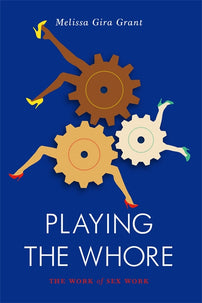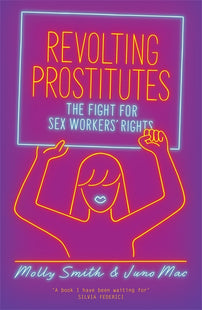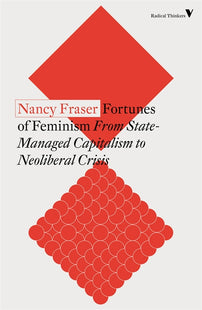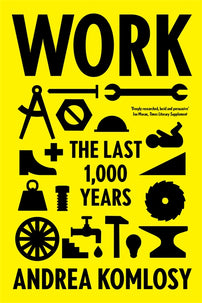‘Not a workplace’: Julie Bindel and the school of wrong abolitionism
Sophie Lewis on bodies, work and the misguided school of feminist abolitionism.

Sometimes plucking the low-hanging fruit can expose an entire ideological tree from root to tip. At least, that is what I want to wager in going after – given the oft-lamented tiredness of the ‘Sex Work Wars’ – the most recent Guardian column by anti-trans, anti-prostitution and anti-surrogacy advocate Julie Bindel: “Prostitution is not a job. The inside of a woman’s body is not a workplace.”*
Even more so than the book she’s been crowd-funding and promoting on mass platforms, the column is almost a perfect teaching-piece. Its point, as with all of Bindel’s writing on the topic, is to rail against the campaigns for decriminalisation despite the fact that major international health watchdogs and NGOs concluded long ago that it reduces the constraints, obstacles and dangers sex workers routinely face in society and (above all) at the hands of the police. In the words of Charlotte Shane, “Laws against sex work are used to control and punish already marginalised women. They are tools for enforcing poverty and state violence.”
As Bindel herself says, “Police powers have been reduced under decriminalisation”. But since the police are very much not a part of society that particular ‘feminist abolitionist’ wants to abolish, she is not cheered by that reduction.
Perhaps it is her own, positive, experiences of the police that allow her to assume that a disempowered police must make working women less safe. But that's being charitable. Decriminalisation’s proponents are not a ‘pro-prostitution lobby’ any more than domestic workers’ rights activists are a ‘pro-housework lobby’. Rae Story spells it out: “I have no wish for the sex industry to develop and expand or be promoted. The fact that I think those of us working in it should be permitted to advertise independently, or work from the same premises, does not contradict this”.
A Nordic Model lobby avowedly exists, worldwide. Within it, Bindel profitably speaks and campaigns against decriminalisation despite the fact that the “male violence” she abhors can actually be reported when workers are not breaking the law by working – putting them in an always-antagonistic relation to the police. At a conscious level at least, she is perfectly oblivious to the fact, oft laid out by Melissa Gira Grant, that criminalisation too is a form (albeit a really bad one) of “regulation”, marking the bounds of whores’ acceptability, their rights and standing as (among other things) political actors. Unconsciously, beneath her ‘abolitionist’ bluster, Bindel may understand that her worldview requires and, in turn, shores up, the power the police wield over prostitutes.
In this way, Bindel distils down to its paradoxical essence the tenacious vein of bad materialism that other contemporary feminist radicals such as Emi Koyama, Selma James, Juno Mac, Molly Smith and Laura Agustín have patiently critiqued over and over again (often from first-hand experience of selling sexual services) in line with the analysis of prostitutes’ collectives worldwide.
Standing on their shoulders, let us look more closely at this low-hanging fruit.
The inside of a woman’s body is not a WORKPLACE
For those of us who aren’t fans of work (most workers) it might seem encouraging to see someone sticking it to workplaces. Unfortunately, Julie Bindel doesn’t actually have a problem with jobs per se, far from it; she just thinks that some of them go too far. She names a number of biomarkets – Ukrainian hair selling, “the breast milk trade in Cambodia”, “blood banks in India”, and gestational surrogacy “in the global south” – as examples of what she most abhors, namely, prostitution: “the practice of using human bodies as a marketplace”.
The first thing to note here is the selection of ‘workplace’ and ‘marketplace’ in this context (rather than, say, ‘worker’). We should stop and ask ourselves what ends it serves to suggest that a gestational surrogate, blood donor, or prostitute, in particular, becomes a place – more so than a mother, athlete, call-centre worker or restaurant critic – under capitalism. It’s easy enough to see where bioethical concern is coming from: intimate labours, sexual labours, clinical labours, gestational labours all intuitively demand especially robust frameworks of worker control.
Yet, as in any industry, prospects for liberation lie in a struggle in which all these human-shaped ‘workplaces’ cooperate together across sectors towards a more liveable, more work-free world. In contrast, banning one half of the commodity exchange, as in the Nordic model (also known as End Demand or the sex-buyer law), which Bindel advocates, isolates, imperils and stigmatizes the people who are meant to be helped leading, for instance, to rushed negotiations between themselves and punters who are seeking to mitigate their own vulnerability.
The second thing to note is the gap between the title statement, “is not a workplace”, and the column’s actual conclusion, “should never be viewed as a workplace.” Which is it? The slippage is actually an overfamiliar moment in bioethical thought. Because of the absence of political economy in these accounts, we tend to suddenly, and near the end, get a fleeting admission that it isn’t (unfortunately) up to us as embodied individuals endowed with labour-power to be caught up in the maelstrom of capitalist accumulation. Instead, we have the meagre wish that humans – women – “shouldn’t” be “viewed” that way. Viewed? By who? By what? By capitalists?
No: these “feminist abolitionists” – as Bindel calls her crew – don’t mean capitalists. (Note: this is not a group that overlaps with feminist prison abolitionists.) For Bindel, it’s what she calls “fun feminists” who are doing the damage. You know the ones! They (we) use the word “whorephobic”, exposing the hypocrisies of a stance that purports to hate only what is done to whores by pimps and johns, while failing to fight for whores’ freedom to do what they choose. For Bindel, it’s morally simple: “[s]upporting the notion that prostitution is ‘labour’ is not a progressive or female-friendly point of view”. Thus, the actually well-researched question of whether or not labour recognition is a good idea for prostitutes is one Bindel can answer easily in the abstract, because, in the abstract, those workers don’t exist. Ta-da! They shouldn’t exist, therefore, they don’t. Seeing prostitutes as workers (albeit that’s how prostitutes understand themselves) is to mock their dignity as human beings who could be doing something else; and to be unsympathetic to their ‘plight’.
But whores don’t need saviours. What they need – as they are always saying – is solidarity.
The inside of a woman’s BODY is not a workplace
Like me, like everyone, Julie Bindel uses her body to do her work. But like many people, she views certain types of applications of the body as qualitatively and not just quantitatively different from what we call (or should call) work. For Bindel, there is no consenting to commercial sex. Accordingly, perhaps the most extraordinary item in her column is her contention that “If prostitution is ‘sex work’, then by its own logic, rape is merely theft.” And this is precisely what Philadelphia judge Teresa Carr Deni said when ruling that a man accused of raping a sex worker at gunpoint had merely committed “theft of services”. It is quite a position for an avowed feminist to take, even to score a point. Despite the embedded appeal to logicality, there is no logic to its reasoning. Would Bindel say that a professional boxer who was punched in a bar had suffered theft, too? Just what does she think a rape ‘steals’ from the body?
As mentioned, Bindel provides no evidence for a bad turn of events for sex workers’ bodily integrity in New Zealand in this column (and no wonder: studies strongly indicate wide-ranging health and safety benefits). No evidence, that is, besides the weakening of the police and a quote from a “sex-trade survivor”, who says she felt even more like “meat” after 2003 than she had before. Indeed, for Bindel, the certainty that body-workers really become meat underlies her principle that “any government that allows the decriminalisation of pimping and sex-buying sends a message to its citizens that women are vessels for male sexual consumption.” It’s as though illegality of sex work were the state of nature, and decriminalisation some kind of inventive act that calls misogyny and patriarchy into being all over again and turns these evils loose on female anatomy. Indeed, purveying respectable civic indignation – of the sort that makes women who don’t do sex work (and don’t fear the police) feel more comfortable in their own bodies – has been prohibitionist feminism’s core business for a couple of centuries.
I’ve written elsewhere - in a wider-ranging etiology of the technophobic, oddly misogynist, anti-queer thought of SWERFs (sex-worker exclusionary radical-feminists) and TERFs (trans-exclusionary radical-feminists) – that, when people like Julie Bindel “promote body acceptance, they have in mind bodies that perform certain genders, not others. They have in mind the bodies cavorting around a fire at the Michigan Womyn’s Music Festival, or bodies stacking shelves and changing nappies, but not bodies selling sexual services.” Yet, on second thoughts, such an assessment of SWERF/TERF body politics is probably far too accepting of its own presentation of itself as representative of working-class interests. In reality (as is also confirmed by Bindel’s enthusiasm for the police), the worldview, with its dignified, sovereign, organic idea of the human body, needs to be understood as profoundly bourgeois. As Feona Attwood points out, “A plastic and unnatural body, coupled with the improper performance of femininity, has frequently been associated with despised groups of women; sex workers, trans women, working-class women.”
The inside of a WOMAN’s body is not a workplace
In some ways this particular noun, while immensely troublesome in a wider RadFem context, is here the most easily demolished of the four. Because she takes womanhood’s victimisation and commodification so much for granted, Bindel makes no case at all for the specificity of women’s exploitation in ‘prostitution’ (however broadly defined, so as to include surrogacy, and so on). In fact, in this piece of rhetoric that is ostensibly about women’s bodies, Bindel explicitly includes allusions to the analogous “desperately hungry men” she saw queuing to sell their blood. Likewise, in the past, she has clumsily fended off imputations of misandry by pointing to her journalistic investigation into the exploitation of sex-working men (“beach boys”) in Jamaica.
Somewhat ironically, it is to the nemesis of the ‘radfems’, Melissa Gira Grant, that we must turn for a class-conscious articulation of women’s interests:
Not all people who do sex work are women, but women disproportionately suffer the stigma, discrimination, and violence against sex workers. The result is a war on women that is nearly imperceptible, unless you are involved in the sex trade yourself. This war is spearheaded and defended largely by other women: a coalition of feminists, conservatives, and even some human rights activists who subject sex workers to poverty, violence, and imprisonment—all in the name of defending women’s rights.
For Julie Bindel and the school of wrong abolitionism, of course, the sex trade is the war on women.
The reason the gesture towards ‘woman’ fails for Bindel and not for Grant is no great mystery. The latter is always thinking with and of trans and non-binary sex-working women, not just cis ones, understanding full well that gender non-conformity and the informal industries have been woven tightly together throughout history by the marginalising and disciplining forces of waged labour markets. So, while not featuring explicitly in this particular column, it would be remiss at this juncture for me not to mention the nastiest part of Bindel’s project, the particularly violent dimension of her thought that is inseparable from her antiprostitutionism yet (in her own mind) distinct from it. Namely: her transphobia.
Published a month before the tragic death of veteran sex-working activist Laura Lee, whom it villainises, Bindel’s book The Pimping of Prostitution: Abolishing the Sex Work Myth excludes trans women from womanhood, LGB rights, and feminism, even going so far as to speculate that Sylvia Rivera was not at Stonewall. Indeed, it systematically paints trans women as enemies of feminism, accusing Janet Mock – among many others – of ‘celebrating’ the connection between trans women and sex work (p.282) as part of an “attempt to merge the identities [?] of prostitution and so-called ‘gender-queer’” (p.279). Not content to blame queerness for calls to decriminalise sex-working lives, Bindel then turns around and levels the claim that trans women are overrepresented in sex work for essential reasons: “part of the whole trans woman identity is about presenting as hyper-sexualised” (p.287). We are ultimately presented with a sinister “pact between trans and ‘sex workers’ rights’”, presumably to foist sexual slavery, organised rape and dehumanisation on the (‘natural’) ‘rest’ of womankind. Frankly, the less said about this ahistorical uncomradely nonsense the better.
The INSIDE of a woman’s body is not a workplace
Julie Bindel has not heard of ‘circlusion’. In her fevered imagination, mouth and throat cavities, vulvas, groins, anuses, rectums and the like can only ever be put to use economically by bodies other than those of which they are part. Unlike the voice-boxes of call-centre workers, the muscles of athletes, or the eyeballs of those on the smartphone-assembly line, these elements cannot work: they can only be defiled, exposed and ceded – either via direct physical contact, or visually, via web-cam. An ‘orifice’, here, stands for the inside of a person, a curiously feminised zone. This inside cannot fuck, it can only be fucked; indeed, for some reason, it can only be fucked by a man (here defined, problematically, as someone with a dick) resulting in total loss of dignity. In Shane’s paraphrase: ‘men consume, women are consumed’. Or, as Agustín explains: “the insertion of money” into relationships involving sexual insides is supposed to “signif[y] that no women can ever consent, even when they say they do.”
More so than the historically, culturally (and interpersonally) vexed contingency of where the realm of ‘inside’ so deserving of formal social protections begins and ends, there is the question of wages for the intimacies provided in that realm, and how only the most bourgeois and white of feminisms could seriously link not being paid to dignity. Indeed, given that one of women’s liberation’s major accomplishments has been the insistence that daily ‘invisible’ acts of reproduction (childbearing and -rearing) and social reproduction (feeding, loving, and otherwise replenishing the workforce) constitute concrete labour, it is odd, to say the least, that avowed ‘radical feminists’ still feel so comfortable attempting to humiliate sex workers for (allegedly) not producing value. In their circles, it is around the blowjob, in particular, that mockery accrues. “Can you imagine, treating a blowjob as real work?”, as Shane, who identifies the trope, comments. “Here, women who want to eliminate prostitutes evince the same attitude a lot of the men hiring us do: it’s the easiest money one could ever make. You need only be a body to do it.”
There’s something implicitly foul – ‘femme’, she calls it – about ‘only’ being a body, for Bindel. When confronted with a sex worker’s portrayal of themself as a normal, untraumatised being who hates some aspects of the work, quite likes other aspects, is neither empowered by it, nor particularly debased, Bindel’s faction devolves into a froth of real, ad hominem ire and bamboozlement. This is often characterised by seemingly compulsive mentions of blowjobs and cumshots (how dare you imply you don’t need rescuing from the tawdry scene I’ve conjured in my head!).
I’ve detailed some findings of my morbid fascination for the obsession with wombs and genitalia in SWERF/TERF thought – and SERF (a close cousin I’ve identified, i.e., surrogate-exclusionary radical-feminism)! – in Signs. Visiting the archive of early feminist transphobia, anti-porn activism, and opposition to reprotech (specifically around gestational surrogacy), I proposed that these were peripheral, reactive formations within feminist history that shared two key traits. Firstly, conservative morality: their truncated critique of commodification leads them to exceptionalise corporeal, often racialised ‘dirty’ work (hustling, turning tricks, remaking sex/gender, or gestating a baby for someone else) as profane. Secondly, and relatedly: technophobia. The presence of technological ‘assistance’ or artifice – in a pregnancy, a prostitute’s self-presentation and/or trans women’s flesh – is inorganic; ‘cyborg’, if you will. Since the ‘80s, these feminists have sided resolutely against Donna Haraway’s contaminated, mutant, border-defying techno-animal. They stand instead with deep ecology’s mythic ‘goddesses’ in gynocentric celebration of autochthonous naturalness, ‘female creativity’, and ‘holistic’ sexuality. Under the guise of fighting capitalism and patriarchy, I concluded, these interrelated intellectual projects encrypt profoundly bourgeois, xenophobic and anti-‘femme’ ideas.
Bindel’s latest Guardian column bears out my analysis beautifully. Evidently, to her, the very notion that the state might recognise sex as a skill migrants bring with them across borders is a monumental joke. She is actually constantly cracking jokes to the effect that an “orifice” (a favourite word of hers) has no skills. Will they “create training programmes for girls to perform the ‘best oral sex’ for sex buyers”?! Imagine. (After all, training programmes for the unemployed are so widespread these days that this would be a danger.) Will they force job-seekers to have sex with disabled men as a state-funded health service?!! (Outrage at the principle of forcing job-seekers to do any kind of work seems to be conspicuously missing.) Germany, she spits, takes the view that sex workers might “help disabled people to explore their sexuality”. Horror of horrors: “the carer may be expected to insert the penis of one into an orifice of the other.” This idea, of course, is degrading, dehumanizing, sick: no one – ever – could find satisfaction in that.
Coercive state education for girls in sucking dick, mandatory copulating with ‘disabled men’: the effect of this litany of implicitly Handmaid’s Tale-esque ridicule-cum-prediction is intended to be the undermining of the very notion of an orifice-wielding proletarian doing politics… except insofar as she (archetypally a she) will position herself as a victim, a survivor and an ambulatory testimony of feminist tragedy. It’s a ‘cisterhood’ circuit that enduringly appeals to some (mostly white) bullies even as it circles the plughole of history. So I hope this post contributes in some way to accelerating that spiral, culminating in the abolition – figuratively speaking – of Julie Bindel.
Terrifyingly, in our present context of generalised Trumpoid and cryptofascist empowerment, there are signs on both sides of the Atlantic of a spike in transphobic and whorephobic confidence. But solidarity will win. Women and other embodied human beings will no longer be workers or workplaces. We’ll have trampled the whole matrix of accumulation underfoot, along with the stigma, resentment and bigotry that colluded for so many years in naturalising capitalism’s cult of the police; the cult of work.
---------------------
Sophie Lewis is the author of Full Surrogacy Now, a book about communizing reproduction forthcoming with Verso. She lives in Philadelphia, writing, occasionally translating things (e.g. Communism for Kids, by Bini Adamczak) and helping edit Blind Field: A Journal of Cultural Inquiry. She has a geography PhD from Manchester University and tweets as @lasophus and @reproutopia.
*Credit for the idea behind this piece goes to Petra Davis.
[book-strip index="1" style="display"]


